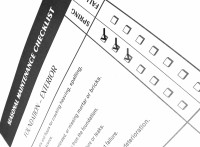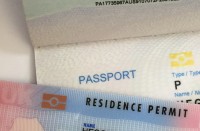Stay within the law and avoid the fines
Very recently, a landlord was fined a record £90,000 by the council for letting a basement conversion that did not meet the legal guidelines set for rental properties. The fine reflected the total rent generated by the flat which had been let for the last 14 years in north London.
The fine is just the latest in a long line of fines issued by councils who have begun cracking down on landlords who do not meet current regulations or make necessary repairs. In some cases, landlords weren’t even aware that they’d fallen foul of regulations until legal notices began appearing in their letterbox. To ensure you are compliant, we have put together a checklist of what every landlord should know as of March 2016.
- Gas safety check – every landlord must obtain a Gas Safety Certificate on all gas appliances, boilers, pipework and flues to ensure that they are in safe working order. This is not work that can be carried out by the landlord but must be conducted by a Gas Safe engineer who will issue a CP12 certificate which must then be passed onto tenants within 28 days. New tenants should be handed a copy of the certificate before the start of the tenancy.
Note – a gas safety certificate tests to ensure there are no gas leaks on the appliances, that they are to current regulations and working within normal parameters at the time of the inspection and is a legal requirement. This should not be confused with an optional boiler service which checks/tests/cleans all the internal workings of a boiler in order to keep it operating efficiently.
- Smoke and carbon monoxide alarms – this is a new regulation that came into effect in October 2015. Landlords are now required to have at least one smoke alarm on every floor of the property. Landlords are also required to have a carbon monoxide detector in any room where there is a solid fuel appliance such as a wood burning stove or a coal fire. These are relatively rare in London, though, so carbon monoxide detectors are rarely an issue for most Benham & Reeves Lettings’ landlords, however, CO alarms are recommended as best practice if there is a gas boiler.
- Energy Performance Certificate (EPC) – although rarely a concern for tenants, landlords must still provide them with an EPC that provides an assessment on how energy efficient a property is. Double
 glazed windows, combi boilers and good insulation provide higher scores than a draughty, poorly-insulated house although the EPC does take the property’s age into account. In theory, tenants should be able to estimate their average energy bills from the EPC.
glazed windows, combi boilers and good insulation provide higher scores than a draughty, poorly-insulated house although the EPC does take the property’s age into account. In theory, tenants should be able to estimate their average energy bills from the EPC.
- Tenancy Deposit Scheme (TDS) – One recent report suggested that a record number of landlords are failing to register their tenants’ deposits. It’s a false economy if landlords fail to register the deposit with one of the Government’s three approved schemes. Once the deposit is received, landlords have 30 days to deposit the funds or face fines of three times the value of the deposit.
- Furniture and furnishings regulations – this is a fairly straightforward regulation stating that all furniture needs to be fire-resistant. This includes beds, headboards, mattresses, sofas and cushions. Landlords furnishing their properties with new furnishings purchased in the UK will be compliant as all new furniture manufactured in the UK meets these standards. However, landlords who furnish their properties with old, cast-off furniture will probably not meet this standard.

- Electrical safety – landlords are not currently required to carry out an Electrical Installation Condition Report (every five years) or a Portable Appliance Test (annually) but there are statutes in law noting that Landlords have a “duty of care” in this regard. Simply put, a landlord must ensure that all electrical appliances, plugs and sockets are safe. Benham & Reeves Estate Agents strongly recommends that an electrical safety check be conducted at the start of each new tenancy, or will require that the appropriate waiver is signed.
- Legionnaires Disease – Legionella bacteria is the cause of a potentially fatal condition called Legionnaires Disease. The bacteria are water borne and the disease can be transmitted when contaminated water droplets are inhaled. Properties with air conditioning systems or spa pools are most at risk but even hot and cold water systems are a potential source of contamination. Landlords are required to take reasonable steps to prevent contamination, including a risk assessment on a regular basis.
- Right to rent – this is the newest regulation that has just been implemented in 2016. Landlords must ensure that all adult tenants are legally allowed to reside in the UK unless the tenant is a British, EU or Swiss national. Landlords must check for proof of ID and citizenship to ensure the tenant has the legal right to residency in the UK.

- Landlord license – A handful of councils require all landlords to be licensed. To date, this only applies to five London boroughs although almost all London boroughs require a license if the property is a House in Multiple Occupation (HMO) – i.e. let to more than three unrelated tenants.
- Landlord insurance – landlords are not required to have insurance but it is highly recommended. It is relatively inexpensive and many policies even cover the rent in the event of non-payment. Choosing content as well as building insurance is advisable, as a surprisingly high number of tenants choose not to take content insurance out, leaving the property unprotected from damages, whether furnished or unfurnished. Landlords must ensure that the policy is updated at the start of every new tenancy, and that their property complies with the conditions set out in the policy.
If you are thinking about letting your property, call us on 020 7435 9681 for further advice and information.
International offices

















 glazed windows, combi boilers and good insulation provide higher scores than a draughty, poorly-insulated house although the EPC does take the property’s age into account. In theory, tenants should be able to estimate their average energy bills from the EPC.
glazed windows, combi boilers and good insulation provide higher scores than a draughty, poorly-insulated house although the EPC does take the property’s age into account. In theory, tenants should be able to estimate their average energy bills from the EPC.
